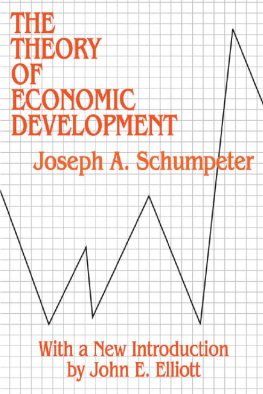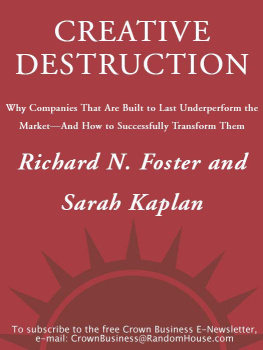Cover
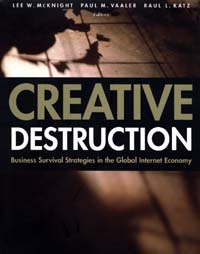
| title | : | Creative Destruction : Business Survival Strategies in the Global Internet Economy |
| author | : | McKnight, Lee W.; Vaaler, Paul M.; Katz, Raul Luciano. |
| publisher | : | MIT Press |
| isbn10 | asin | : | 026213389X |
| print isbn13 | : | 9780262133890 |
| ebook isbn13 | : | 9780585381374 |
| language | : | English |
| subject | Technological innovations--Economic aspects--Congresses, Evolutionary economics--Congresses, Organizational change--Congresses, Internet--Congresses, Globalization--Congresses. |
| publication date | : | 2001 |
| lcc | : | HC79.T4C74 2001eb |
| ddc | : | 658.4/062 |
| subject | : | Technological innovations--Economic aspects--Congresses, Evolutionary economics--Congresses, Organizational change--Congresses, Internet--Congresses, Globalization--Congresses. |
Page i
CREATIVE DESTRUCTION
Page ii
Page iii
CREATIVE DESTRUCTION
Business Survival Strategies in
the Global Internet Economy
L EE W. M C K NIGHT
P AUL M. V AALER
R AUL L. K ATZ
Editors

Page iv
Copyright 2001 Massachusetts Institute of Technology
All rights reserved. No part of this book may be reproduced in any form by any electronic or mechanical means (including photocopying, recording, or information storage and retrieval) without permission in writing from the publisher.
Printed and bound in the United States of America.
Library of Congress Cataloging-in-Publication Data
Creative destruction: business survival strategies in the global Internet economy/Lee W. McKnight, Paul M. Vaaler, Raul L. Katz, editors.
p. cm.
A collection of 12 papers which grew out of a March 1999 symposium held at the Fletcher School of Law and Diplomacy, Tufts University. Creative Destruction or Just Destruction? Telecoms in Transition: Survival and Success in the Global Internet Economy' was co-sponsored by the Fletcher School's Hitachi Center for Technology and International Affairs, the Fletcher School's Edward R. Murrow Center for International Information and Communication, and Booz-Allen & Hamilton.
Includes bibliographical references and index.
ISBN 0-262-13389-X (hc.: alk. paper)
1. Technological innovationsEconomic aspectsCongresses. 2. Evolutionary economicsCongresses. 3. Organizational changeCongresses. 4. InternetCongresses. 5. GlobalizationCongresses. I. Title: Business survival strategies in the global Internet economy. II McKnight, Lee W. III. Vaaler, Paul M. IV. Katz, Raul Luciano.
| HC79.T4 .C74 2001 |
| 658.4'062 dc21 | 00-053708 |
Text design and composition: Paperwork
Cover design: Three Fish Design
Page v
For our wives and families
Page vi
Page vii
CONTENTS
Acknowledgments | ix |
PART I Introduction |
Chapter 1 Introduction to Creative Destruction | |
Lee W. McKnight, Paul M. Vaaler, and Raul L. Katz |
PART 2 Theory and Practice of Creative Destruction |
Chapter 2 Innovation and Creative Destruction | |
William J. Baumol |
Chapter 3 Internet Business Models: Creative Destruction as Usual | |
Lee W McKnight |
PART 3 The Global Context for Creative Destruction |
Chapter 4 Creative Destruction in Latin American Telecommunications Privatization | |
Walter T. Molano |
Chapter 5 Creative Destruction in European Internet Industries and Policies | |
Jill Hills and Maria Michalis |
Chapter 6 Social Communications Innovation and Destruction in Japan | |
Leslie Helm |
PART 4 Business Destruction Strategies in the Global Internet Economy |
Chapter 7 Alliance Enterprise Strategies Destroying Firm Boundaries | |
Peter Pekar, Jr. |
Chapter 8 Creating and Destroying Shareholder Value Across Borders | |
Paul M. Vaaler |
Chapter 9 The Internet Protocol and the Creative Destruction of Revenue | |
Terrence P. McGarty |
Page viii
PART 5 Creative Business Survival Strategies
Chapter 10 A New Theory of the Internet Firm191William LehrChapter 11 Sustainable Open Source Software Business Models213Jean CampChapter 12 Alternative Industry Futures in the Global Internet Economy229Martin G. Hyman and Raul L. KatzContributors241Notes249References269Index281
Page ix
ACKNOWLEDGMENTS
This book would never have been completed without the support and guidance of many people and organizations. Our first and deepest expression of gratitude is for the original work and timely insights of the diverse group of authors who contributed to this book: William Baumol of New York University, Jean Camp of Harvard University, Leslie Helm of Glocom University (Japan), Jill Hills and Maria Michalis of the University of Westminster (UK), Marty Hyman and Peter Pekar of BoozAllen & Hamilton, William Lehr of Columbia University and the Massachusetts Institute of Technology, Terry McGarty of Zephyr Communications, and Walter Molano of BCP Securities. They shared our enthusiasm for developing a deeper understanding of creative destruction and its relevance to Internet-related industries, firms, and political and social policies. The contributing authors combined that enthusiasm with insight and analysis specific to their own backgrounds, research interests, and experience.
We also are grateful to all of the participants in the symposium that brought many of these authors together for the first time to begin to explore these issues. Creative Destruction was stimulated by a symposium held at the Fletcher School of Law and Diplomacy, Tufts University, Creative Destructionor Just Destruction? Telecoms in Transition: Survival and Success in the Global Internet Economy. The symposium was co-sponsored by the Fletcher School's Hitachi Center for Technology and International Affairs, the Fletcher School's Edward R. Murrow Center for International Information and Communication, and BoozAllen & Hamilton. The symposium brought together
Page x
leading academic and professional commentators on the key technological, regulatory, organizational, and competitive dynamics compelling change in the way firms and their stakeholders do business in an increasingly global and Internet-centric society.
The symposium panels, papers, and presentations sparked a lively debate among the participants, which was ably moderated by panel chairs from the Fletcher School faculty, including Carsten Kowalczyk, Lisa Lynch, and Joel Trachtman. There were excellent panelist and paper presentations from the invited participants. We single out for special recognition chief executives Frank Blount of Telstra (Australia); Steven Chrust, founder of Winstar Communications and SGC Advisory Services; Juan Carlos Masjoan of Telecom Argentina; Terrence McGarty of Zephyr Communications; Hitachi America's chief technologist, Kenji Takeda; corporate strategist Takashi Hatchoji of Hitachi Ltd (Japan); executive vice presidents Randall Battat of Motorola Corporation and Andrew Morley of Level 3 Communications; Bill Griffin, formerly of GTE; Richard J. Solomon of the University of Pennsylvania; and Robert Pepper, chief of the U.S. Federal Communications Commission, Office of Plans and Policy. These panelists and others stirred the pot of ideas for all of us striving to link Joseph Schumpeter's concept of creative destruction to the dynamics reshaping firms, industries, and regulatory policies worldwide. We thank all of the panelists for their contributions. We also thank the Fletcher School, BoozAllen & Hamilton, and John Wylie of Credit Suisse-First Boston (Australia) for their financial sponsorship and support of the symposium.
Next page

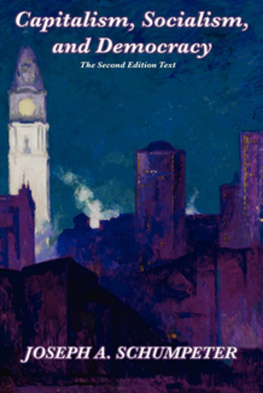
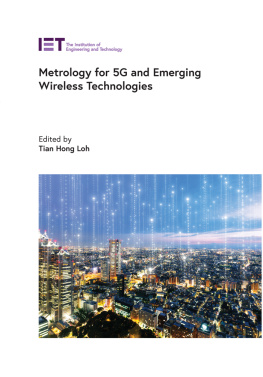
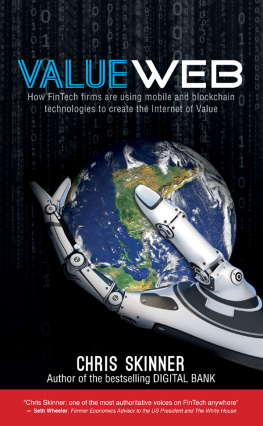
![Chris Skinner [Chris Skinner] - ValueWeb: How fintech firms are using bitcoin blockchain and mobile technologies to create the Internet](/uploads/posts/book/119678/thumbs/chris-skinner-chris-skinner-valueweb-how.jpg)
